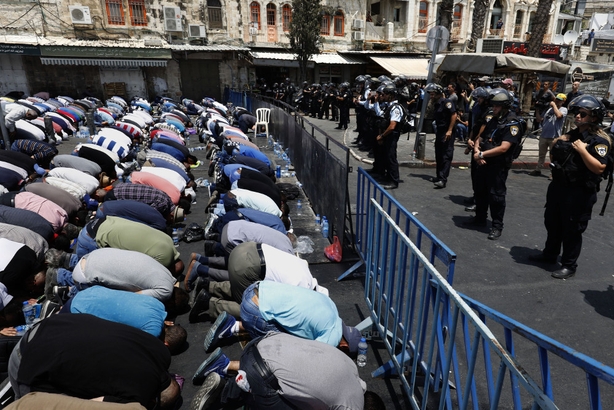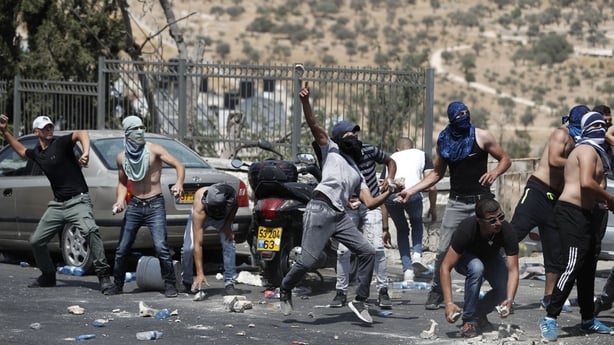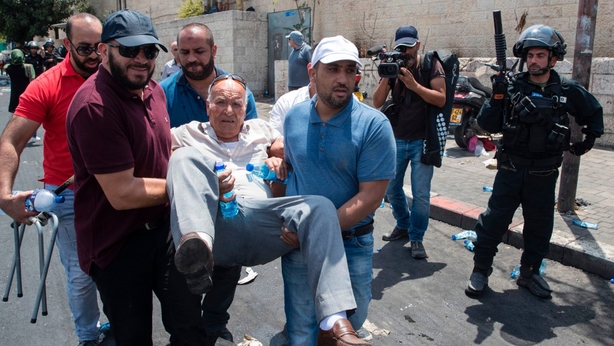At least three Palestinians have been killed in violent clashes outside a Jerusalem shrine, while three Israelis died after they were stabbed to death at a Jewish settlement in the occupied West Bank.
Palestinian worshippers and Israeli security forces clashed outside a Jerusalem shrine today in violence prompted by the installation of metal detectors at its entry point.
At least three Palestinians were killed in the violence.
Separately, an assailant broke into a home in a Jewish settlement in the occupied West Bank today and stabbed four Israelis, with three dying from their wounds, the army said.
There have been daily confrontations between Palestinians hurling rocks and Israeli police using stun grenades since the detectors were placed outside the sacred venue, known to Muslims as the Noble Sanctuary and to Jews as Temple Mount, on Sunday, following the killing of two Israeli policemen.
We need your consent to load this rte-player contentWe use rte-player to manage extra content that can set cookies on your device and collect data about your activity. Please review their details and accept them to load the content.Manage Preferences
The shrine includes the al Aqsa Mosque, the third-holiest site in Islam, and the golden Dome of the Rock.
It was also the site of an ancient Jewish temple, the holiest place in Judaism.
The Palestinian Health Ministry said Mohammed Sharaf, 17, and Mohammad Hassan Abu Ghannam, age unknown, died of gunshot wounds in two neighbourhoods of East Jerusalem somewhat away from the centre of tension in the walled Old City.
It reported a third Palestinian fatality, Mohammed Lafi, 18, later.
It was not immediately clear who fired the shots, with unconfirmed media reports that an Israeli from a settlement int he nearby occupied West Bank was responsible in Mohammed Sharaf's death.
Israel's Channel 10 reported that a child of eight had died from tear gas inhalation, but that could not be confirmed.
Despite international pressure to remove the metal detectors, Prime Minister Benjamin Netanyahu's security cabinet decided early today to keep them in place, saying they were needed to prevent arms being smuggled into the shrine.

In protest, thousands of worshippers gathered for Friday prayers at various entrances to the sacred compound, which sits on a marble and stone plateau in the Old City.
They refused to enter, preferring to pray outside, in some cases filling the narrow alleyways of the Old City's Muslim quarter.
"We reject Israeli restrictions at the Aqsa Mosque," said Jerusalem's senior Muslim cleric, Grand Mufti Mohammad Hussein.
Muslim leaders and Palestinian political factions had urged the faithful to gather for a "day of rage" against the new security policies, which they see as changing delicate agreements that have governed the holy site for decades.
But by early afternoon, with police mobilising extra units and placing barriers to carry out checks at entrances to the Old City, there had been little serious violence.
Access to the shrine for Muslims was limited to men over 50 but open to women of all ages.
Roadblocks were in place on approach roads to Jerusalem to stop buses carrying Muslims to the site.
At one location near the Old City, stone throwers did try to break through a police line, and police used stun grenades to drive them back.


Israeli police spokesman Micky Rosenfeld said four officers were injured in the sporadic clashes and the Palestinian Red Crescent ambulance service said at least 377 protesters had been hurt, some suffering from tear gas inhalation.
The hilltop compound has long been a source of religious friction.
Since Israel captured and annexed the Old City, including the compound, in the 1967 Middle East war, it has also become a symbol of Palestinian nationalism.
Yesterday, Turkish President Tayyip Erdogan called Israeli President Reuven Rivlin to press for the removal of the metal detectors.
Nickolay Mladenov, the UN special coordinator for the Middle East, appealed for calm and the White House called for a resolution.
Jordan, the custodian of the holy site, has also been involved in mediation efforts.
But Mr Netanyahu's 11-member security cabinet opted in a late-night meeting to retain the metal detectors to ensure no weapons were smuggled in, a week after three Arab-Israeli gunmen shot dead two Israeli policemen in the vicinity of the complex.
Far-right members of Mr Netanyahu's government - which relies on religious, rightist and pro-settler parties for support – had publicly urged him to keep the devices in place.

